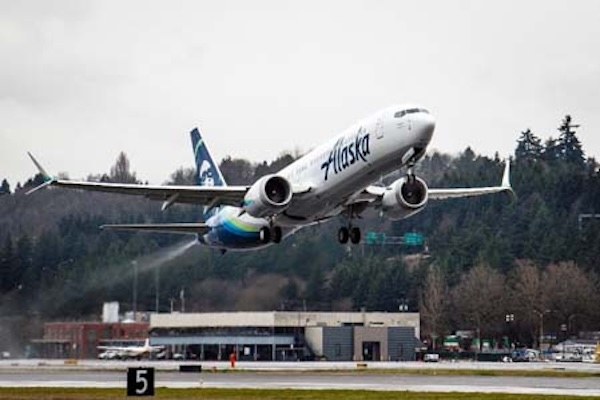Boeing faces increased scrutiny after the Alaska Airlines incident.
The company’s CEO, Dave Calhoun, emphasises the need for improving safety and quality protocols.
Boeing’s Commitment to Safety and Quality
Boeing’s CEO, Dave Calhoun, communicated to staff the ongoing commitment to improve safety and quality following the Alaska Airlines 737 Max 9 incident. The event has highlighted the need for more work, especially regarding the company’s safety protocols and manufacturing processes. Calhoun stressed transparency and cooperation with the Federal Aviation Administration (FAA) to ensure trust and safety among stakeholders.
Transparency with regulators and customers is crucial, Calhoun noted. The dedication to safety involves cooperating with the FAA and undertaking a quality management system assessment. Boeing aims to assure all parties of its commitment to safety and quality improvements. The approach includes listening to employees’ input to strengthen procedures effectively.
Financial Performance Amid Challenges
Boeing reported a reduced net loss of $30 million in the fourth quarter of 2023, a substantial improvement from the $663 million loss in 2022. Annual losses were halved to $2.2 billion as revenues increased by 17% to $77.8 billion, reflecting resilience in the face of operational challenges.
The commercial aircraft sector returned to profitability, reporting $41 million in earnings for the final quarter. This turnaround, from a $603 million loss the previous year, was driven by a 13% increase in revenue to $10.5 billion. The progress reflects Boeing’s effort to stabilise its operations amidst quality and safety concerns.
Operational Adjustments and Future Outlook
Boeing delivered 528 aircraft in 2023, marking a 10% increase from the previous year. This improvement was achieved despite the quality assurance issues highlighted by the Alaska Airlines incident.
Calhoun emphasised that while financial and operational updates are usually shared, the priority now is on quality improvement. Focusing efforts on the 737 programme, Boeing paused production for a day to redirect focus on quality standards, a crucial step to reinforce confidence in its manufacturing processes.
Boeing’s backlog exceeds 5,600 aircraft, valued at $441 billion, indicating robust demand despite recent setbacks. The company continues to build momentum, striving to meet delivery expectations and enhance stakeholder confidence through transparent operations and quality focus.
Response to the Alaska Airlines Incident
In response to the Alaska Airlines incident, Boeing is taking immediate steps to improve the quality of the 737 programme. This includes more rigorous inspections within its factories and at supplier facilities.
The company has paused production briefly to ensure these quality measures are properly integrated. An independent assessment by an external expert further underscores the importance Boeing places on maintaining rigorous quality standards.
Calhoun has assured stakeholders of Boeing’s commitment to addressing these quality challenges comprehensively. Direct conversations with customers and regulators underline the seriousness with which Boeing is addressing its quality shortcomings.
Leadership and Organisational Changes
To strengthen oversight and quality assurance, Boeing has brought in an external expert to lead an independent assessment. This initiative underscores the company’s commitment to addressing safety and quality deficiencies. Calhoun’s leadership in this transition reflects a commitment to an internal culture of transparency and accountability.
Boeing’s approach involves not just addressing the current incident but implementing broader changes to prevent future issues. The leadership is focused on fostering an environment where transparency and proactive measures become integral to Boeing’s operations.
The emphasis on communication and quality demonstrates Boeing’s dedication to rebuilding trust with customers and regulators, as well as mitigating operational risks that have historically impacted its performance.
Stakeholder Confidence and Future Strategy
Building stakeholder confidence remains a priority for Boeing. By focusing on each aircraft delivery and maintaining open communication with regulators, Boeing aims to assure all parties involved of their commitment to safety and quality.
Calhoun conveyed confidence in the company and its employees, stressing the importance of collective effort to meet these challenges head-on. “I have confidence in you and I have confidence in Boeing,” he stated, highlighting the potential for recovery and sustained success.
Amid these efforts, Boeing is poised to navigate operational challenges by adhering to its meticulous safety standards and proactive stakeholder engagement strategies.
The Path Forward for Boeing
As Boeing navigates the aftermath of the Alaska Airlines accident, the focus shifts to rebuilding its reputation through dedicated safety and quality initiatives. Commitment to transparency with the FAA affirms the company’s dedication to rectifying past oversights.
Boeing is committed to addressing safety challenges and rebuilding trust with all stakeholders.
The company focuses on delivering quality and transparent communication to reinforce its industry standing.

